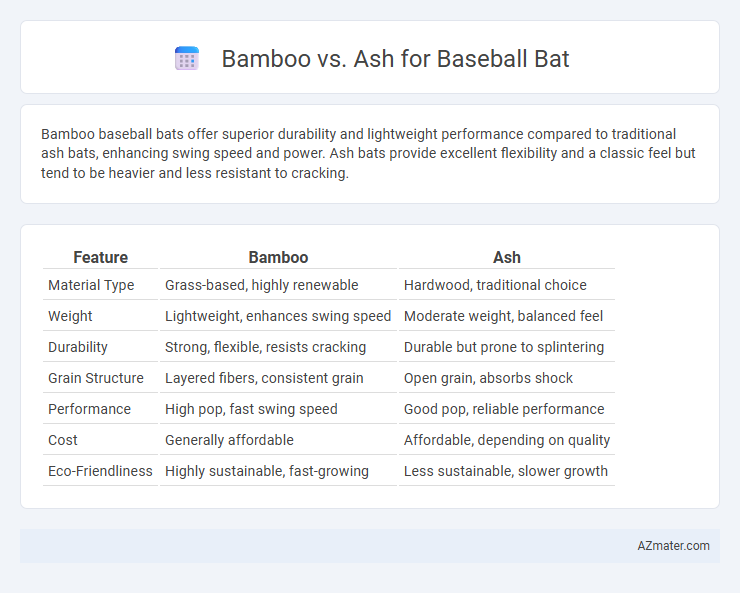Bamboo baseball bats offer superior durability and lightweight performance compared to traditional ash bats, enhancing swing speed and power. Ash bats provide excellent flexibility and a classic feel but tend to be heavier and less resistant to cracking.
Table of Comparison
| Feature | Bamboo | Ash |
|---|---|---|
| Material Type | Grass-based, highly renewable | Hardwood, traditional choice |
| Weight | Lightweight, enhances swing speed | Moderate weight, balanced feel |
| Durability | Strong, flexible, resists cracking | Durable but prone to splintering |
| Grain Structure | Layered fibers, consistent grain | Open grain, absorbs shock |
| Performance | High pop, fast swing speed | Good pop, reliable performance |
| Cost | Generally affordable | Affordable, depending on quality |
| Eco-Friendliness | Highly sustainable, fast-growing | Less sustainable, slower growth |
Introduction to Baseball Bat Materials
Baseball bats are commonly crafted from bamboo and ash, two materials with distinct properties influencing performance and durability. Bamboo bats offer enhanced strength and flexibility due to their composite grain structure, making them lighter and more resistant to impact. Ash bats, valued for their straight grain and traditional feel, provide a balanced combination of stiffness and lightweight characteristics, favored by players seeking classic aesthetics and reliable pop.
Overview of Bamboo Baseball Bats
Bamboo baseball bats are renowned for their superior strength-to-weight ratio and exceptional durability compared to traditional hardwood bats like ash. Their natural density and fibrous structure provide enhanced flex and resilience, resulting in increased swing speed and power. Bamboo bats also feature eco-friendly properties, making them a sustainable choice for players seeking both performance and environmental benefits.
Overview of Ash Baseball Bats
Ash baseball bats are known for their lightweight and flexible properties, providing excellent shock absorption and a large sweet spot, which enhances hitting performance. The open-grain structure of ash allows for better bat control and increased bat speed, making it a popular choice among professional and amateur players. Ash bats also offer a traditional feel and durability, although they are more prone to flaking and chipping compared to denser woods like bamboo.
Strength and Durability Comparison
Bamboo baseball bats offer superior strength due to their dense, interwoven fibers that enhance impact resistance, making them less prone to cracking under high-speed hits. Ash bats, renowned for their flexibility and lightweight properties, provide reliable durability but are more susceptible to splintering upon repeated impact. While bamboo excels in strength and longevity, ash remains favored for its balance of durability and responsive performance in the batter's swing.
Weight and Balance Differences
Bamboo baseball bats are generally lighter than ash bats, offering increased swing speed and quicker reaction times. Ash bats feature a more traditional weight distribution with a balanced feel, providing better control and consistency during swings. The density and grain structure of bamboo allow for a lighter bat with a slightly end-loaded balance, enhancing power without sacrificing maneuverability.
Performance and Flexibility
Bamboo baseball bats offer superior performance due to their lightweight nature and high tensile strength, allowing for faster swing speeds and enhanced ball exit velocity. Ash bats provide excellent flexibility with their natural grain structure, giving players more whip and control during swings, which can improve contact precision. Performance-wise, bamboo's durability and resistance to warping make it a popular choice, while ash remains favored for its balanced flex and traditional feel.
Cost and Availability
Bamboo baseball bats generally cost more due to their eco-friendly manufacturing process and limited production, while ash bats are more widely available and affordable because of the abundant supply and traditional use in the sport. Ash offers consistent performance at a lower price point, making it a popular choice among amateur and professional players seeking cost efficiency. Bamboo's durability and sustainable appeal justify its higher price but may require more effort to source, especially in specialized markets.
Environmental Impact and Sustainability
Bamboo baseball bats offer superior sustainability due to bamboo's rapid growth rate, requiring less water and no pesticides compared to ash trees, which take decades to mature and contribute to deforestation. Bamboo's regenerative qualities allow for frequent harvesting without significant environmental degradation, reducing carbon footprint compared to the slow regrowth cycle of ash. Choosing bamboo supports eco-friendly manufacturing processes and promotes responsible material sourcing in the sports industry.
Professional and Amateur Usage
Bamboo baseball bats offer superior durability and a lightweight profile, making them popular among professional players seeking enhanced swing speed and consistency. Ash bats, favored in both professional and amateur leagues, provide a traditional feel with excellent flexibility and a larger sweet spot for powerful hits. While bamboo excels in energy transfer and longevity, ash remains a preferred option for players who value performance versatility and cost-effectiveness.
Choosing the Right Bat: Bamboo vs Ash
Choosing between bamboo and ash for a baseball bat depends on factors like durability, weight, and performance. Bamboo bats offer superior strength and flexibility with a harder surface, resulting in increased pop and durability, while ash bats provide a lighter, more traditional feel with excellent shock absorption and control. Players seeking a balance between power and control may lean toward ash, whereas those prioritizing durability and hitting power often prefer bamboo.

Infographic: Bamboo vs Ash for Baseball Bat
 azmater.com
azmater.com